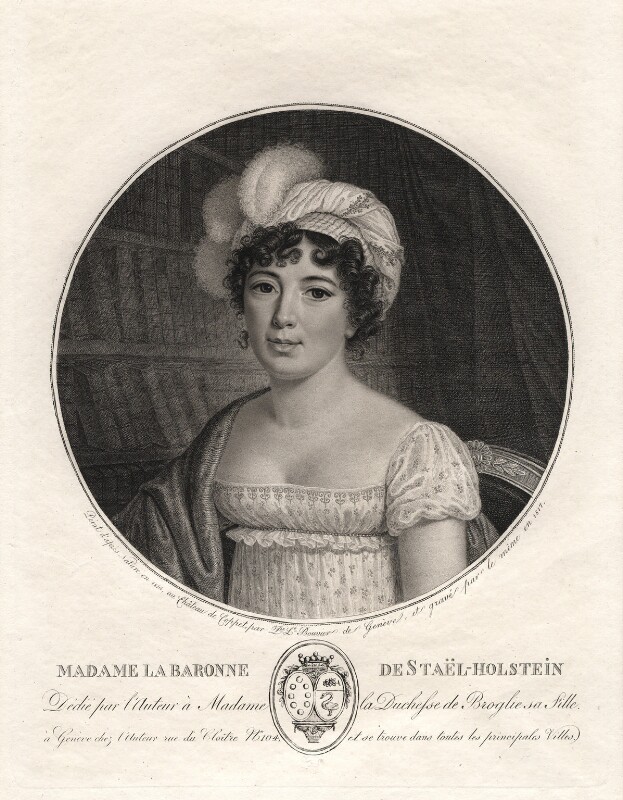Liberty Matters
A Cosmopolitan in Life and Works

As has already been mentioned by Benjamin Hoffmann and Aurelian Craiutu, enthusiasm is a positive force for Staël in many fields. I would like to look at something which is often associated with her treatment of enthusiasm. One of the core values in Staël's approach to combatting the spirit of party and which nobody has yet mentioned is, I think, her cosmopolitanism. Let me explain what I mean. Staël was in many ways a "natural" cosmopolitan, if there is such a thing: she was born in Paris to Swiss Protestant parents. Her mother was of French Huguenot heritage; her paternal grandfather was born in Brandenburg (then an electorate, now part of Poland). During her childhood in the family's "salon," she had occasion to meet a wide variety of visitors, including most of France's leading thinkers, but also many foreigners. She traveled to England as a child, and her father purchased a château by the shores of Lake Geneva where they spent time. During her years of exile after the Revolution, Staël brought together European intellectuals in this château, Coppet, which came to represent what Stendhal referred to as "the Estates General of European opinion."[96] She also spent time in various European countries, including Italy, Sweden, current-day Germany, Russia, England, etc. As a writer, too, Staël showed her openness to foreign cultures. In On Literature (1800), she defended the idea of distinct Northern and Southern aesthetics as well as political traditions and showed her preference at once for Ossian and melancholy poetry and for parliamentary regimes. In Corinne ou l'Italie (1807), she penned a tragic sentimental tale which is also a reflection on the future of Europe and how Italy—then a set of fragmented little States—could, through culture and a common sense of history, become a great nation once again. Staël's major essay, De l'Allemagne (On Germany) was only finally published in 1813: Napoleon's police had seized the proofs and tried to stop it from coming out. The official reason subsequently given was edifying as the author recounts: "mon ouvrage n'étoit pas françois" ("My work was not French.").[97] With its wide-ranging discussion of German society and culture, the book showed that language and culture can provide foundations for national unity, and it invited the French to take interest in intellectual and literary trends across the Rhine. It did a lot to raise interest in Kantian philosophy and the whole of the Romantic movement.
At a time when Napoleon was seeking to impose a one-size-fits-all approach to politics, Staël was pleading for individual differences and openness to other traditions. She saw difference as an opportunity to learn from others rather than to charge in and overturn centuries of tradition. For her, encounters with foreigners were not to be considered as threats one might have to forfeit anything, but rather as guarantees of gain. This is possibly best summed up in something she wrote in "On Germany":
"Nul homme, autant supérieur qu'il soit, ne peut deviner ce qu'il se développe naturellement dans l'esprit de celui qui vit sur un autre sol et respire un autre air. On se trouvera donc bien en tout pays, d'accueillir des pensées étrangères car dans ce genre, l'hospitalité fait la fortune de celui qui reçoit."[98]"No man, however superior, can guess what develops naturally in the mind of one who lives on a different soil and breathes in a different air. As a result, in any country, one would do well to welcome foreign thoughts for, in this area, hospitality makes the fortune of he who receives."
Surely that is a thought for our time. Getting our contemporaries to take this on board and act upon the consequences of such an idea would doubtless be a step in the right direction if we are to hope to further the greater common good.
Endnotes
[96.] Stendhal, Rome, Naples et Florence (Paris, 1817), p. 327-28.
[97.] Staël, Préface, De l'Allemagne, Œuvres complètes (Paris: Treuttel et Würtz, 1820), vol. X, p. 13.
[98.] Staël, De l'Allemagne, vol. XI, p. 145.
Copyright and Fair Use Statement
“Liberty Matters” is the copyright of Liberty Fund, Inc. This material is put on line to further the educational goals of Liberty Fund, Inc. These essays and responses may be quoted and otherwise used under “fair use” provisions for educational and academic purposes. To reprint these essays in course booklets requires the prior permission of Liberty Fund, Inc. Please contact oll@libertyfund.org if you have any questions.